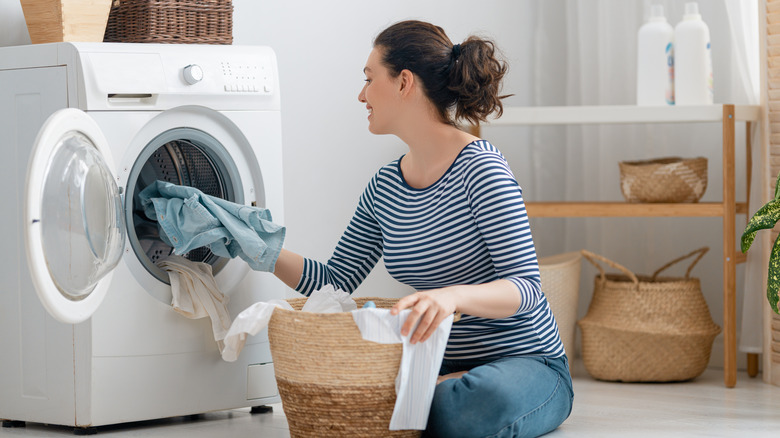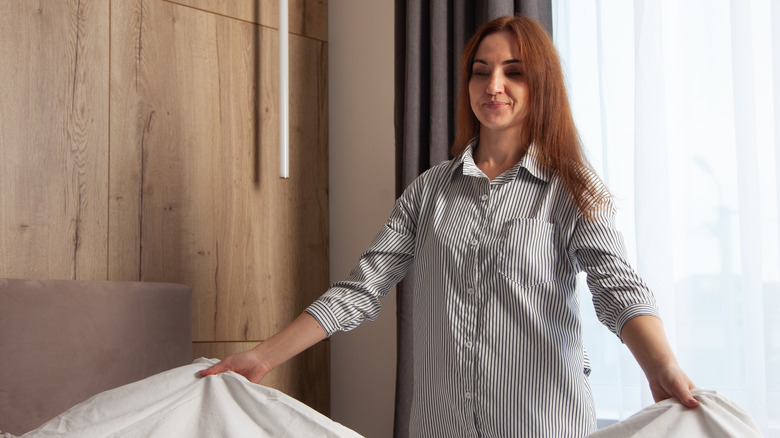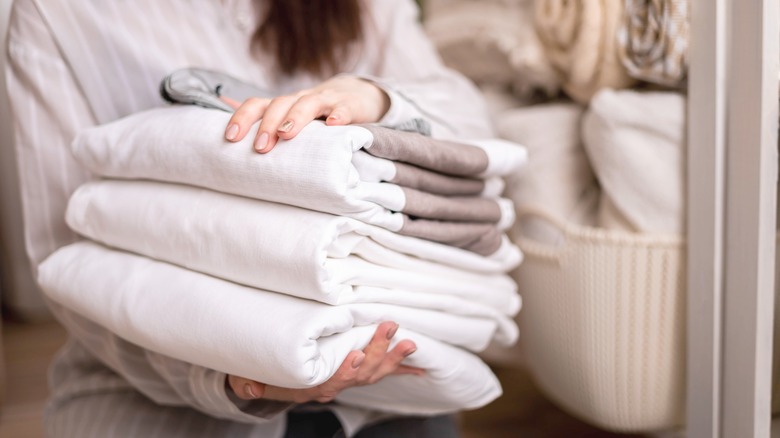How To Improve Your Laundry Habits, According To The French
We may receive a commission on purchases made from links.
Here in the U.S., we tend to value speed and efficiency in all things work, dating, and domestic, possibly at the cost of savoring the smaller moments. But of course, other cultures have slightly different priorities. We can learn and borrow from them to elevate our own quality of life.
For example, the French tend to ritualize many of their activities, giving them their full, undistracted focus and slowing down a bit (compared to our usual breakneck pace). That way, they derive more pleasure from things like preparing a meal or even doing something as mundane as the laundry. Yes, the French might find more pleasure than we do in the way they do the laundry. They incorporate certain habits that keep the wrinkles at bay while honoring their love of ritual.
While Americans might throw all the wet laundry in the dryer, quickly fold it without much thought, and toss everything in the closet. In France, there's a more mindful system of how they clean. They prefer natural detergents and avoid chemicals. On this, we agree as fabric softener affects towels and linens in a negative way.
Why the French approach is useful
American author Danielle Postel-Vinay wrote a book called "Home Sweet Maison: The French Art of Making a Home." Referring in the book to a French woman who was an early mentor, she writes, "Jacqueline once told me that the French find pleasure in daily life in a way that other people don't..."
One of the inspirations from Postel-Vinay's book is to adapt French cultural traditions that can benefit your lifestyle and make your house more homey and pleasant. For instance, if you feel inspired by the French preference to minimize the use of chemicals and your linens are a bit scratchier than you'd like, a baking soda hack will soften your sheets.
But the main idea is to make something mundane into a ritual, to treat with respect or even reverence the objects we use and that serve us daily. This is a different attitude than we might be used to. And while we're not going to hurt a sheet's feelings if we roll it into a ball, when we're ready to use it, that'll be one wrinkly-looking sheet. Think of it as a more intentional way of living rather than simply carrying out a utilitarian task that needs to get done. The attitude shift is away from a thoughtless, hurried pace and more toward enjoyment. Making laundry day into a ritual can help us feel and show gratitude. Here's how the French approach laundry.
Improving your laundry habits
We've adapted several approaches to laundry from Postel-Vinay's book — incorporate some or all of them. And as you read through these habits, if your first thought is immediate resistance to slowing down, consider how a slower pace for a couple of hours could actually help you be more present or possibly offset symptoms of burnout. While only you know your obligations and schedule, sometimes a strong objection to slowing down can be a red flag that you need it. Why not use the laundry as an excuse to take time for yourself?
As they're prepping for the laundry, many French folks have on hand a variety of stain removers specifically formulated to lift one particular stain versus the catch-all products we tend to use most often, like OxiClean. The author encountered unique, natural stain lifters while visiting her husband's family in rural France. To adapt this, we recommend small amounts of diluted white vinegar for synthetics and wool, hydrogen peroxide for rust and blood, getting out pen marks with rubbing alcohol, and using mineral spirits or acetone to lift paint (but avoid this on synthetics). To reduce damage, the French turn all clothes inside out before washing. Although less practical in a city, many French people avoid using a dryer unless absolutely necessary, choosing to line dry most items. If you don't like ironing, try to reframe it as therapeutic, as it's a mainstay of French laundry day. Finally, they fold everything properly.


